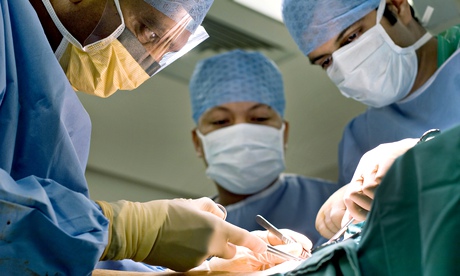NHS told to spend billions on reform or face oblivion
Outgoing boss Sir David Nicholson warns that billions in extra funding will be needed for 'painful' change
Denis Campbell
theguardian.com,
Wendsday121h, March 2014

Billions of extra funding will be needed for the NHS to help push through "painful and unprecedented" changes during the next parliament, the outgoing boss of the health service warns.
In a frank interview with the Guardian, Sir David Nicholson said that whoever formed the next government would need to give the NHS extra cash because it could not survive if it had to remain in the straitjacket of austerity-era flat budgets after 2015.
The money would be needed so the NHS can dramatically rationalise hospital services, and concentrate its specialist and GP services – allowing an NHS Nicholson calls "unsustainable" to ditch its outmoded reliance on hospital-based treatment and switch to a new model of community-based care.
Nicholson declined to say how much more cash he believed would be required, but another senior NHS leader privately suggested it could be up to £5bn extra a year for several years.
The NHS chief executive's call for a "change fund" on top of the service's existing £110bn budget has sparked a renewed debate about whether the NHS should remain a special case for ministers confronting further years of tight public finances – and how much it needs to cope with the ongoing and future rise in demand for healthcare.
Hospital services would also have to be centralised on a huge scale, he warned. GP surgeries needed to give up their role as the NHS's equivalent of "corner shops" and a large proportion of hospital care should be delivered in community settings if the NHS is to cope with the pressures posed by the ageing population, rise in the number of patients with one or more long-term conditions such as asthma or diabetes, and demand for new treatments, Nicholson said.
In future there needed to be no more than 40-70 major centres of A&E care, while the number of organisations providing specialised services like cardiac care and transplantation had to shrink from 300 to just 15-30, he said. He declined to put a figure on what would be the ideal number of GP surgeries in a streamlined organisation.
"We know this change can be done," he said. "And we know that more preventive work in the community reduces demand on hospitals and that concentrating specialised services leads to better outcomes for patients.
"But it's hard to imagine doing all those things without some financial flexibility to enable us to do that, some kind of change fund that would enable us to do that", said the NHS boss, who leaves his post at the end of the month after eight years to be replaced by Simon Stevens, former adviser to Tony Blair and Alan Milburn.
The extra cash would allow the NHS to run existing hospitals while new services in the community were created and built up with the intention of providing a large amount of care.
It used a "change reserve" when it moved mental health care in the 1980s from traditional asylums, which were closed, to new community-based services – and that proved successful, he explained.
Without the NHS undertaking an overhaul in the way it delivered care it would face "managed decline over a period", with fewer nurses on wards, rationing of drugs, longer waiting times for treatment and a general decline in the quality of care, he said.
The changes required were vital but are also "huge, massive [and] unprecedented; industry-wide change", and would be "painful for staff" and difficult to persuade the public to accept. But failure to push them through could result in a decline in the quality of NHS care – triggering a boom in private healthcare and a collapse in public support for the service, he warned.
It is "unavoidable" that the next government would have to provide extra money to smooth that transition, he said.
Paul Burstow, a Liberal Democrat health minister in the coalition until late 2012, said that Nicholson's message was "a realistic assessment of what's needed to make change happen" but "will be unwelcomed by people in all the parties responsible for Treasury policies".
Nicholson's intervention comes as the tightness in the NHS's finances will be illustrated when Danny Alexander, the chief secretary to the Treasury, announces on Thursday that all NHS staff will not be receiving the 1% across the board pay rise from next month promised last year by the chancellor, George Osborne.
It is understood that the health secretary, Jeremy Hunt, decided to block the award because he believed the NHS could not afford the expected £600m cost involved. Some staff are still expected to get an increase.
Christine McAnea, head of health at the Unison trade union, said: "If this rumour is true, NHS staff will be very angry. Their pay has fallen behind over the past few years and they deserve a decent pay increase and not to be treated with contempt by the coalition.
"I cannot believe that the government would be so foolish as to deny even a paltry 1% to nurses, paramedics and therapists – it would be electoral suicide."
Professor Chris Ham, chief executive of the King's Fund health thinktank, also backed Nicholson.
"Our analysis confirms that it is now inevitable that the next government will need to find additional funding for health and social care. The alternative is to accept significant cuts to services that will harm care," said Ham, a former adviser to David Cameron on the NHS

